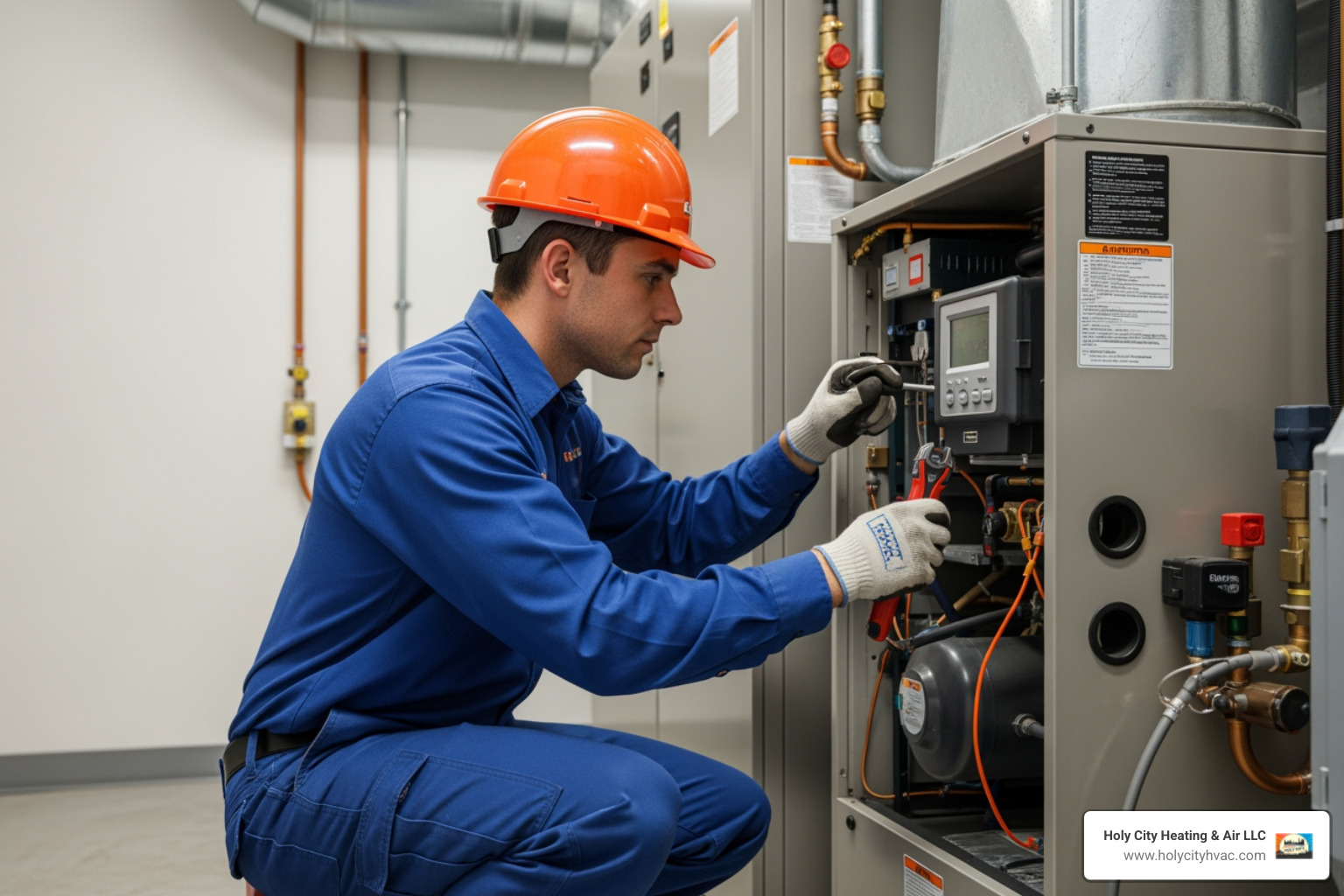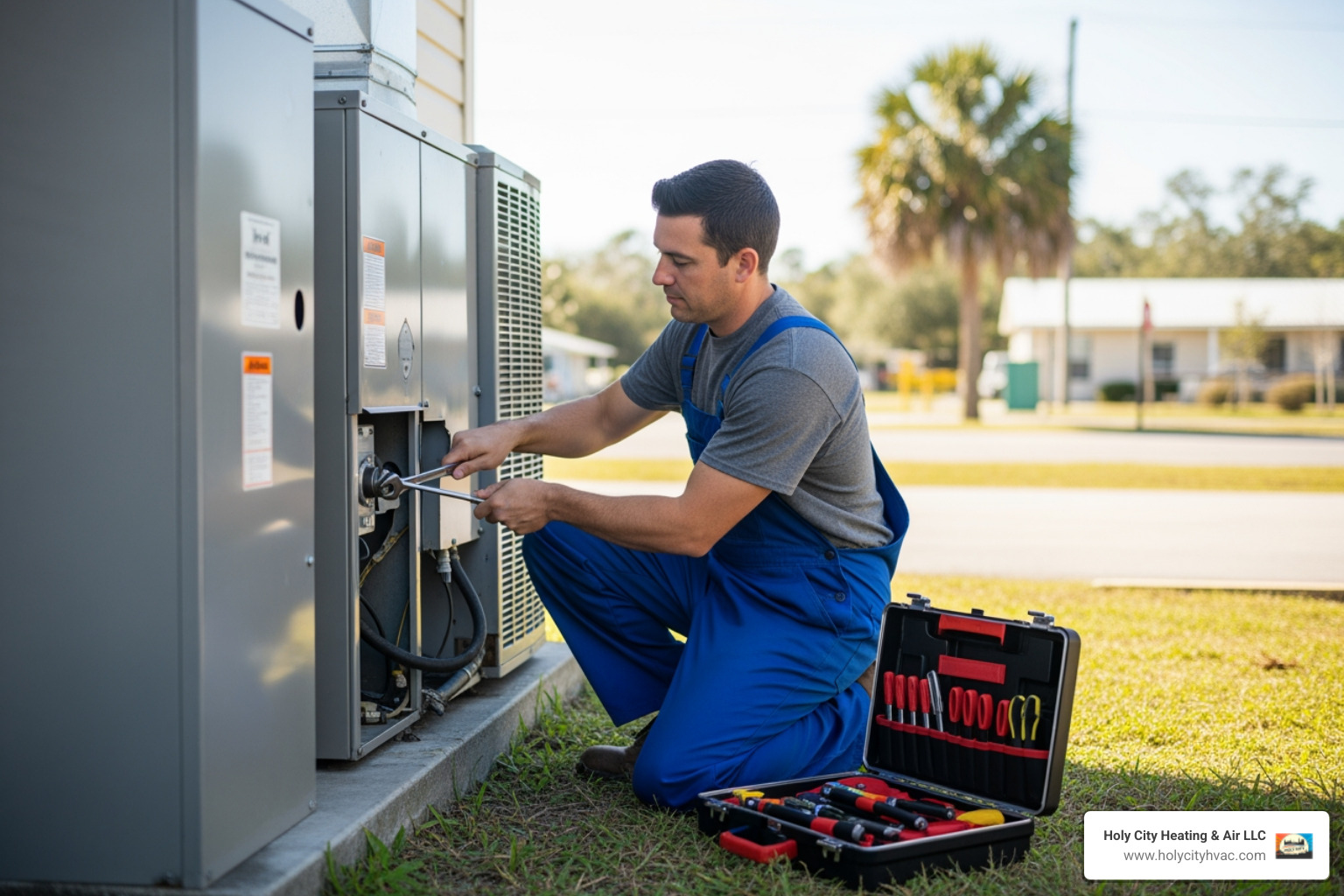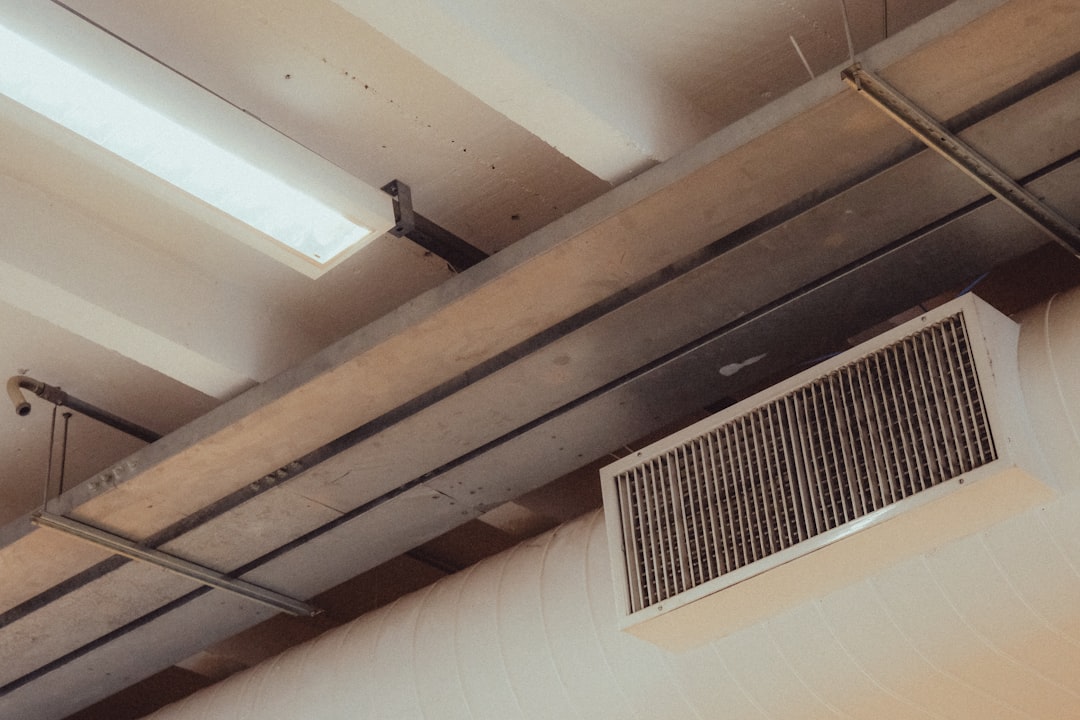
Waking Up to a Cold Shower? Here's What to Do First
No hot water in your Charleston home can turn a good morning into a frustrating start to your day. If you're reading this, chances are you just had that shocking experience of stepping into an ice-cold shower when you expected hot water.
Quick Solutions for No Hot Water:
- Check your breaker box - Look for tripped breakers labeled "water heater"
- Inspect the pilot light (gas heaters) - Should have a steady blue flame
- Press the reset button on your water heater tank
- Verify gas supply is turned on (gas models)
- Look for leaks around the base of your tank
The good news? Most hot water problems have simple causes that you can often fix yourself. Whether it's a tripped breaker, an out pilot light, or a thermostat that needs adjusting, many Charleston homeowners can get their hot water flowing again without calling a professional.
Common culprits include:
- Power or gas supply issues
- Faulty thermostats set too low
- Failed heating elements or pilot lights
- Sediment buildup from our local hard water
- Broken internal components like dip tubes
But before you start troubleshooting, there's one critical safety check you need to do first - especially if you have a gas water heater.
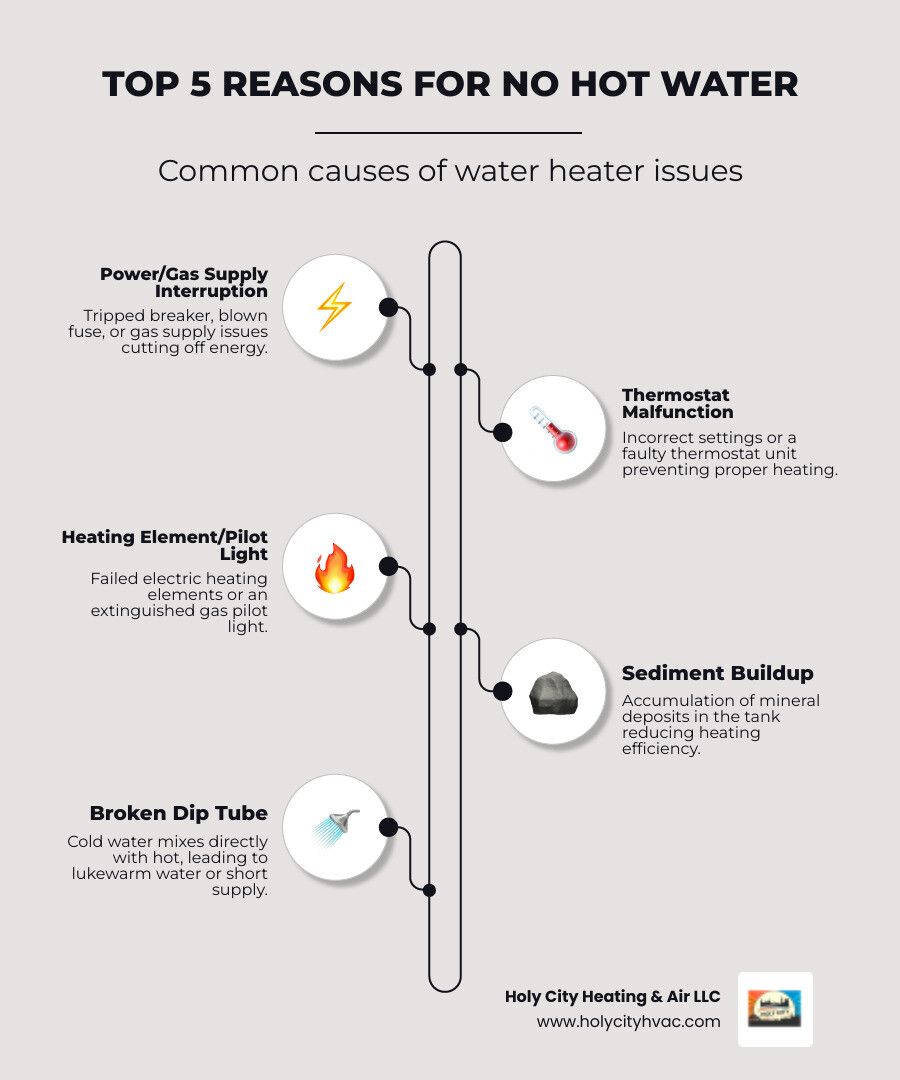
Critical Safety First: Do You Smell Gas?
Before you start troubleshooting your no hot water problem, there's one safety check that could literally save your life. If you have a gas water heater and catch a whiff of that distinctive rotten egg smell, stop everything you're doing right now.
That smell isn't just unpleasant – it's your nose detecting a potentially dangerous gas leak. Natural gas companies add this sulfur-like odor specifically so you'll notice it, because natural gas itself is actually odorless.
Here's the thing about gas leaks: they don't mess around. Even a tiny spark from flipping a light switch or pressing your water heater's reset button could ignite the gas. That's why your first move should be getting everyone (including your pets) out of the house immediately.
Once you're safely outside, open windows and doors if you can do so without going back inside. This helps the gas disperse instead of building up to dangerous levels. Don't worry about your belongings – they can be replaced, but you can't.
From a safe distance away from your home, call your utility provider and the fire department. In our Charleston area, that's typically Dominion Energy for natural gas issues. These professionals know exactly how to handle gas leaks safely.
If you know where your home's main emergency shutoff valve is located (usually near your gas meter), and you can reach it safely from outside, go ahead and turn off the gas supply to your entire home. But only do this if you don't have to go near the suspected leak area.
What to do if you smell gas isn't something to figure out in the moment – it's better to know these safety precautions ahead of time.
Your safety always comes first. When in doubt, evacuate and let the professionals handle it. No hot shower is worth risking your family's wellbeing.
Troubleshooting Common Causes of No Hot Water
Now that we've covered the critical safety check, let's roll up our sleeves and figure out why your Charleston home is no hot water central this morning. The good news? Most water heater problems have straightforward solutions, and many you can tackle yourself with just a few basic tools and some patience.
Whether you have a gas or electric water heater, they share some common troubleshooting steps, but each type has its own personality quirks. Here's a quick comparison to help you steer the detective work:
| Issue / Heater Type | Gas Water Heater Checklist | Electric Water Heater Checklist |
|---|---|---|
| Power Supply | Check gas valve & supply line | Check circuit breaker/fuse box |
| Ignition | Pilot light on? Thermocouple? | Reset button pressed? |
| Heating Element | Burner working correctly? | Heating elements okay? |
| Thermostat | Correct setting? | Correct setting? |
| Leaks | Check tank & connections | Check tank & connections |
Let's dive deeper into each type and get your hot water flowing again.
Diagnosing an Electric Heater with No Hot Water
Electric water heaters are like the reliable workhorses of the water heating world - when they work, they work great. When they don't, it's usually something pretty straightforward that's gone wrong.
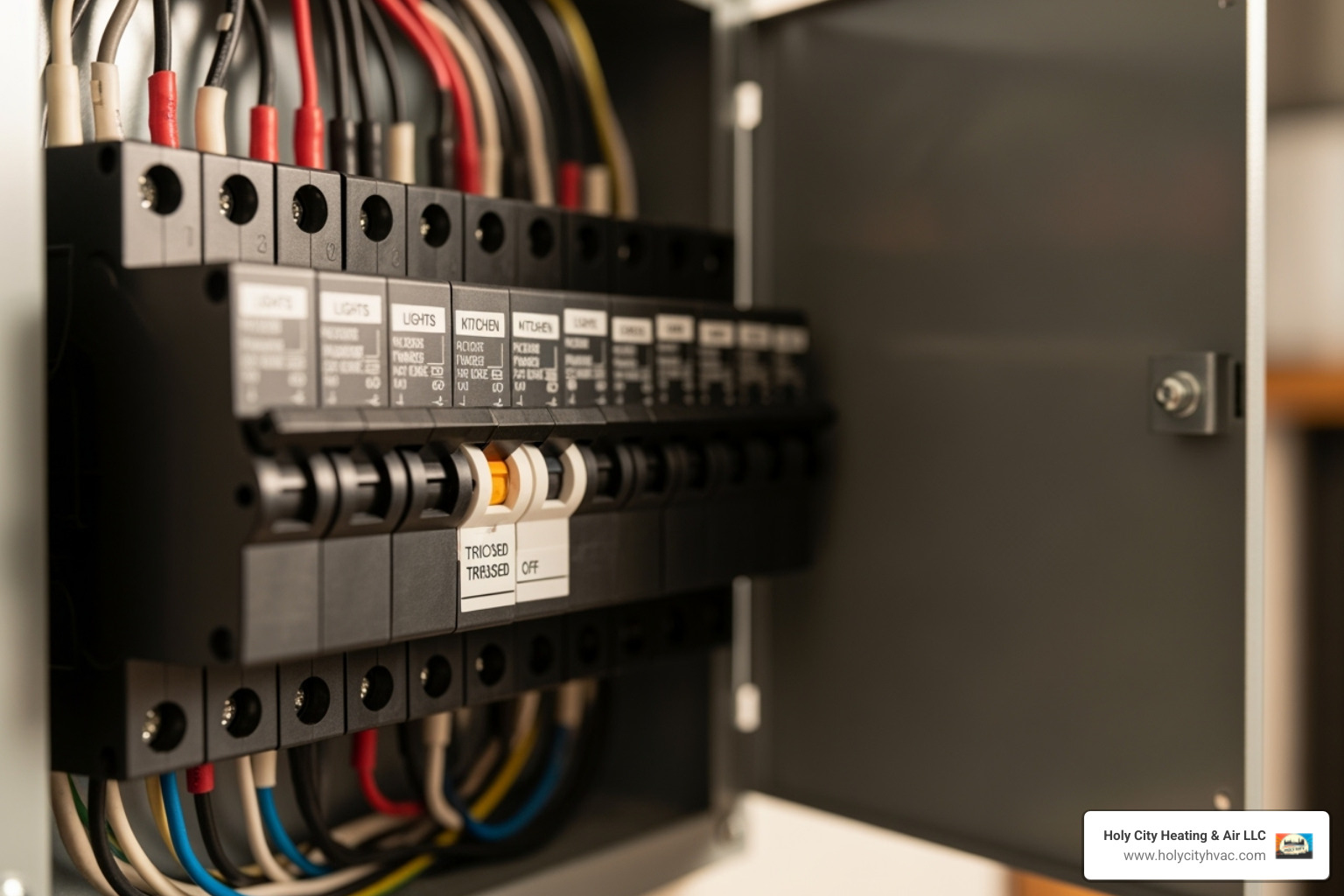
Start with your circuit breaker - this is hands down the most common culprit. Head to your electrical panel and look for the breaker labeled "water heater." If it's tripped, it'll be sitting in the middle position or flipped to "off." Give it a firm push all the way to "off" first, then flip it back to "on." You should hear a satisfying click. If it trips again immediately, you've got a more serious electrical issue that needs professional attention.
In older Charleston homes, you might find a fuse box instead of breakers. Check the fuse marked for your water heater - if it's blown, the metal strip inside will be broken or the glass will be blackened. Replace it with a new fuse of the same amperage rating.
The reset button is your next stop. Most electric water heaters have a red reset button tucked away behind an access panel, usually near the thermostat. This little button is connected to the high-temperature cutoff switch - a safety feature that shuts everything down if your water gets dangerously hot. Turn off the power at the breaker first, remove the access panel, press the button firmly, then replace the panel before turning the power back on.
If you're still dealing with no hot water or lukewarm water that runs out quickly, you might have faulty heating elements. Electric water heaters typically have two - an upper and lower element. When one fails, you get some hot water but not much. When both fail, you get none. Testing these requires a multimeter and some electrical know-how, so this is often where we recommend calling in the pros.
Thermostat problems can also leave you shivering. The thermostat tells the heating elements when to kick on and off. If it's not communicating properly, your elements might not be getting the message to heat up. Like heating elements, diagnosing thermostat issues usually requires electrical testing that's best left to experienced technicians.
What to Do When You Have No Hot Water from a Gas Heater
Gas water heaters have their own set of potential hiccups, but they're generally pretty straightforward to troubleshoot. Think of them as having a few more moving parts than their electric cousins, but each part has a specific job that's easy to understand.
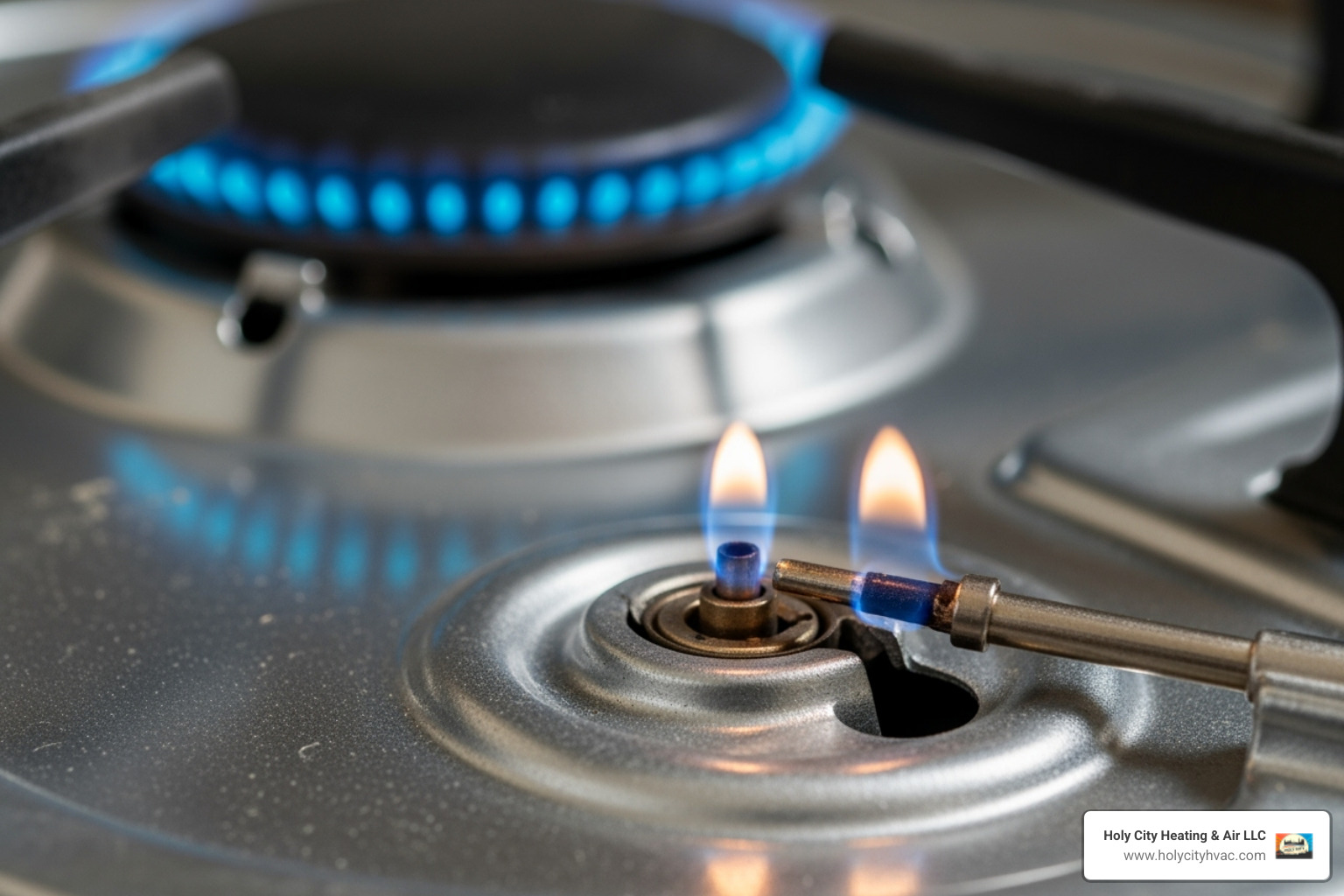
Check your pilot light first. Many older gas water heaters depend on a small, continuous flame called a pilot light to ignite the main burner when you need hot water. If this little flame goes out, your water heater is essentially taking a nap. Peek through the viewing window or remove the access panel - you should see a steady blue flame about the size of your fingertip.
If the pilot light is out, don't panic. Relighting it is usually straightforward, though you'll want to follow your owner's manual for the specific steps. Generally, you'll turn the gas control knob to "pilot," hold down a button to release gas, and use the spark igniter or a long lighter to relight it. Always give any unburned gas time to clear out before attempting to relight - we're talking about 5-10 minutes of patience here.
Thermocouple troubles are sneaky. This little safety device sits right next to the pilot light and acts like a security guard - it senses whether the pilot is lit and tells the gas valve it's safe to send gas to the burner. When it fails, your pilot light might go out repeatedly or refuse to stay lit even after you relight it. It's doing its job by preventing gas from flowing when there's no flame to burn it, but a faulty thermocouple can be overly cautious.
Gas supply issues can also cause no hot water. Make sure the gas shutoff valve leading to your water heater is fully open - sometimes after other work around the house, these valves get accidentally turned or only partially opened. If you use propane, check that your tank isn't empty. Even with natural gas, supply problems can occur, though they're less common.
Burner problems usually announce themselves with odd flame colors or weak flames. A healthy gas burner should produce blue flames. Yellow or orange flames, or flames that seem weak or uneven, often indicate the burner needs cleaning or adjustment. This is definitely professional territory - gas appliance work requires proper training and tools.
The gas valve itself can also fail over time. This component is like the brain of your gas water heater, controlling gas flow based on what the thermostat is telling it. When it stops working, everything else might seem fine, but the burner just won't get the gas it needs to fire up.
Universal Problems Affecting All Water Heater Types
Whether you've got a gas or electric unit, some water heater problems don't discriminate. These universal issues often sneak up on homeowners and can leave you wondering why you suddenly have no hot water – or why your hot water just isn't quite right anymore.
The reality is that most water heaters have a lifespan of about 10 years. If your unit is getting up there in age, it's more likely to develop these common problems that affect all tank-style water heaters.
Your water heater tank itself can develop leaks or internal corrosion over time. Even a small leak can dramatically reduce your hot water supply, while internal corrosion can affect how efficiently your unit heats water.
Sometimes the issue isn't with heating at all – water pressure problems can make it seem like you're not getting enough hot water when really it's just taking forever to reach your faucets. And if your temperature and pressure relief valve (that's the T&P valve) starts acting up, it can dump hot water constantly, leaving you with a tank that can't keep up.
How Sediment Buildup Steals Your Hot Water
Living in Charleston means dealing with our local water quality challenges. Our hard water is loaded with minerals like calcium and magnesium, and over time, these minerals settle at the bottom of your water heater tank like unwelcome houseguests who refuse to leave.
This sediment buildup creates a thick, insulating layer between your heating elements (or gas burner) and the water above. Think of it like trying to heat a pot of water with a thick towel wrapped around the bottom – it's just not going to work efficiently.
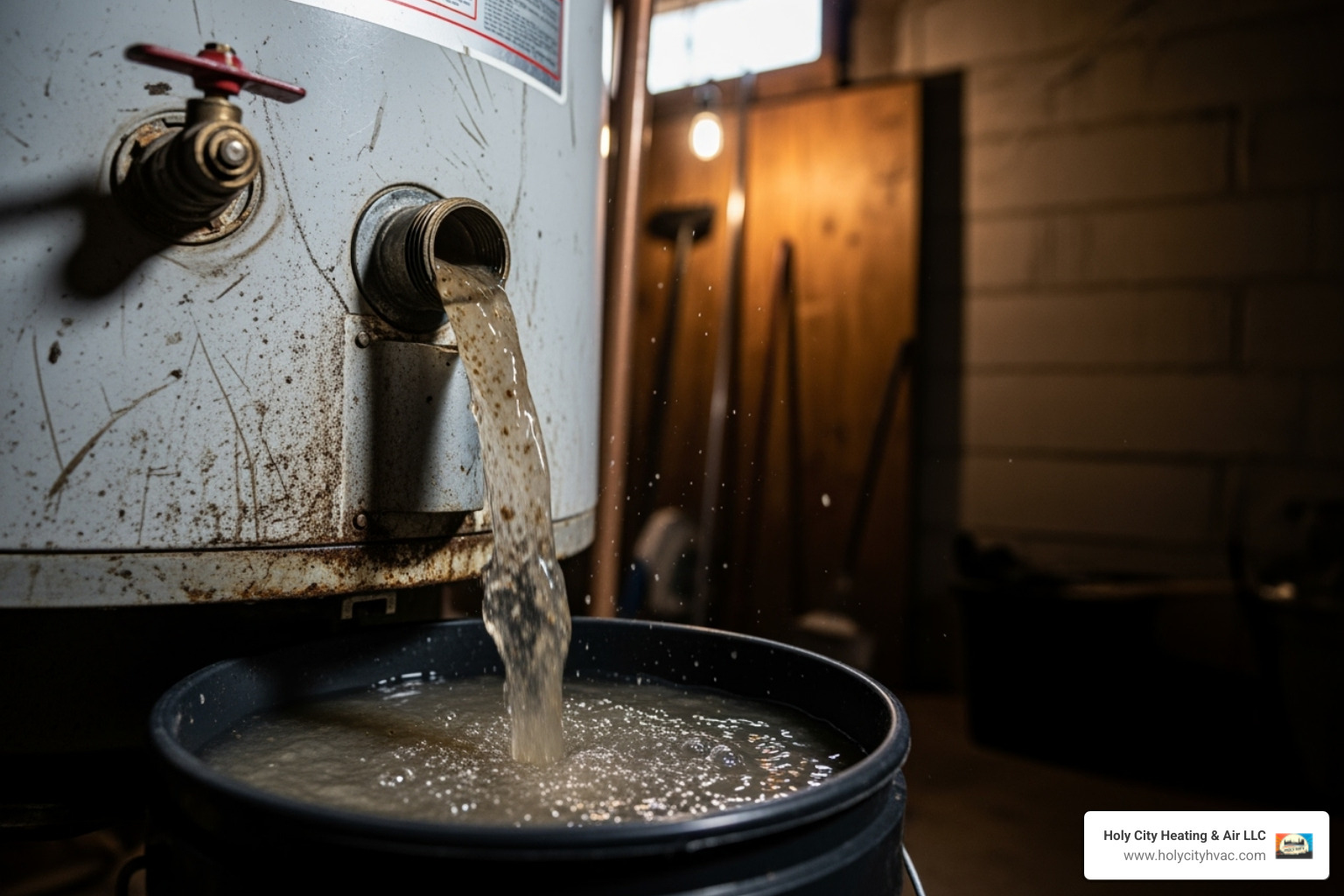
You'll know sediment is stealing your hot water when your energy bills start creeping up and you're getting less hot water than usual. The real giveaway? Strange noises coming from your water heater – rumbling, popping, or banging sounds. That's water trapped under the sediment layer literally boiling and bubbling as your heating element struggles to do its job.
The sediment also takes up physical space in your tank, meaning there's less room for actual hot water. It's like having a bucket that's half full of rocks – you can only fit so much water in there.
Flushing your tank annually is the best way to fight back against sediment buildup. This involves draining several gallons from the bottom of your tank to wash out all that accumulated gunk. Here in the Lowcountry, with our hard water conditions, this maintenance step is especially important.
Is a Broken Dip Tube the Culprit?
Here's one that stumps a lot of homeowners: you're getting some hot water, but it's never really hot, and it runs out ridiculously fast. You might even find tiny pieces of plastic in your faucet aerators. Meet the broken dip tube – a sneaky little problem that can make your water heater act like it's half the size it actually is.
The dip tube is a long plastic pipe inside your water heater tank that directs incoming cold water straight to the bottom, where it gets heated. When this tube breaks or deteriorates, cold water dumps right into the middle of your hot water instead of going where it's supposed to.
The result? Lukewarm water that never gets truly hot, and hot water that runs out fast because cold water is constantly mixing with your heated supply. It's like someone's standing at your water heater with a pitcher of cold water, constantly diluting your hot water supply.
Finding plastic debris in your faucets is often the smoking gun that confirms a broken dip tube. Those little white or clear plastic pieces are literally chunks of your broken dip tube floating around in your water system.
Unfortunately, replacing a dip tube means working inside your water heater tank, which is definitely a job for professionals. But the good news is that once it's fixed, you'll feel like you have a brand new water heater again.
Checking the Thermostat: Is It Set Correctly?
Sometimes the solution to no hot water is embarrassingly simple – your thermostat just isn't set high enough. Before you start tearing apart your water heater, take a peek at that temperature dial.
The ideal thermostat setting is 120°F. This temperature hits the sweet spot between giving you properly hot water and keeping your energy bills reasonable. It's also hot enough to kill harmful bacteria but not so hot that you'll get scalded in the shower.
If your thermostat is set correctly but you're still having temperature issues, the thermostat itself might be the problem. Thermostat malfunctions can cause wild temperature swings – one minute you're getting scalding water, the next it's ice cold.
Watch out for the high-limit switch tripping repeatedly. This safety feature shuts everything down when water gets dangerously hot, but if it keeps happening, your thermostat is probably sending mixed signals to your heating system.
You can usually adjust the thermostat setting yourself, but if you suspect the thermostat is actually broken rather than just set wrong, it's time to call in the professionals. A faulty thermostat doesn't just waste energy – it can create safety hazards too.
Maintenance and Knowing When It's Time for an Upgrade
Let's be honest - your water heater has been working hard behind the scenes, and sometimes it's trying to tell you something. Maybe it's making strange noises, or you've noticed your hot showers are getting shorter and shorter. Water heaters generally last about 10 years, so if yours is getting up there in age, it might be time to have a heart-to-heart about its future.
Here's how to tell if your faithful water heater is ready for retirement. Age is the biggest factor - once your unit hits that 10-year mark, you're living on borrowed time. Frequent repairs are another red flag; if you feel like you're constantly dealing with issues, your water heater is probably telling you it's tired of the struggle.
Leaks around the base of your tank are particularly concerning because they often signal internal corrosion that can't be fixed. When you turn on your hot water tap and see rusty or discolored water, that's your tank's way of saying its insides are breaking down. And if your energy bills keep climbing even though your usage hasn't changed, your aging water heater is working overtime just to keep up.
The most frustrating sign? Consistently running out of hot water despite following all our troubleshooting tips. Sometimes your tank is simply too small for your growing family's needs, or it's just not heating as efficiently as it once did.
Simple Maintenance to Prevent Future Problems
The good news is that a little TLC can go a long way toward preventing no hot water emergencies and extending your water heater's life. Think of it like taking your car in for regular oil changes - small investments now save you from big headaches later.
Annual flushing is the most important thing you can do for your water heater, especially here in the Charleston area where hard water is common. This simple process removes the sediment that builds up over time and steals your hot water efficiency.
Checking your anode rod every few years might sound technical, but it's actually pretty straightforward. This metal rod inside your tank sacrifices itself to protect your tank from corrosion - kind of like a bodyguard for your water heater. When it's worn down, replacing it can add years to your tank's life.
Don't forget about your temperature and pressure relief valve - that's your water heater's safety net. Testing it occasionally by gently lifting the lever ensures it's ready to protect your home if pressure builds up. Just be careful, because hot water will come out when you test it!
Adding insulation around your tank and the first few feet of pipes is like putting a warm coat on your water heater. It helps retain heat and can lower your energy bills, especially if your water heater lives in an unheated garage or basement.
Scheduling a professional tune-up every couple of years lets our team catch small problems before they turn into big, expensive ones. We can spot gas leaks, check safety mechanisms, and make sure everything is running as efficiently as possible.
Should You Repair or Replace Your Water Heater?
This is probably the most common question we get from Charleston homeowners, and honestly, it's not always an easy answer. The decision usually comes down to dollars and sense - literally.
For simple fixes like a tripped breaker or faulty thermostat, repair is almost always the way to go. These are relatively inexpensive problems that can give you years more service from your current unit.
But when you're looking at major issues like a leaking tank or multiple failed heating elements, the math starts to change. If the repair cost approaches half the price of a new unit, replacement often makes more financial sense in the long run.
Modern water heaters are significantly more efficient than units even just a few years old. Energy Star certified models can lead to noticeable savings on your utility bills, which helps offset the initial investment over time.
Tankless water heaters are worth considering if you're tired of running out of hot water or want maximum efficiency. These units provide endless hot water on demand because they heat water as you use it, rather than keeping a tank full of hot water ready 24/7. They're particularly popular with our customers in Mount Pleasant and James Island who have busy households.
Proper sizing is crucial too. If your family has grown or you've added appliances that use hot water, your current tank might simply be too small. A 40-gallon electric water heater takes about two hours to fully reheat, while a gas unit takes around four hours. If your household's hot water demands exceed what your current system can provide, you'll always be running out at the worst possible moments.
We're here to help you weigh all these factors based on your specific situation, your family's hot water needs, and your budget. Sometimes the right answer is a simple repair, and sometimes it's time to upgrade to something that will serve your family better for years to come.
Get Your Hot Water Flowing Again
Stepping into a cold shower when you're expecting hot water is one of those moments that can really throw off your entire day. But here's the good news: no hot water doesn't have to mean an expensive emergency call or days without comfort.
Throughout this guide, we've walked through the most common culprits behind water heater failures. Whether it's something as simple as a tripped circuit breaker or a more complex issue like sediment buildup from Charleston's hard water, many problems have solutions that don't require a plumbing degree to understand.
The key is knowing when to tackle it yourself and when to call in the professionals. Checking your breaker box, relighting a pilot light, or adjusting your thermostat are all things most homeowners can handle safely. But when it comes to gas line issues, electrical repairs, or replacing major components like heating elements, that's where experience really matters.
Safety always comes first - especially with gas appliances. If you smell that telltale rotten egg odor, don't hesitate to evacuate and call for help immediately. It's just not worth the risk.
At Holy City Heating & Air, we've been helping Charleston families stay comfortable since 2015, and we know how frustrating no hot water can be. Our EPA-certified technicians have seen it all, from simple thermostat adjustments to full system replacements. We're a family-owned business that combines the resources of a growing company with the personal touch you'd expect from your neighbors.
Sometimes the fix is quick and easy. Other times, your water heater might be telling you it's ready for retirement after years of faithful service. Either way, we're here to give you honest advice about whether repair or replacement makes the most sense for your situation and budget.
Don't spend another day dealing with cold showers or lukewarm dishwater. If your troubleshooting efforts haven't solved the problem, or if you'd rather have a professional take a look from the start, we're ready to help restore warmth and comfort to your home.
Contact us for expert plumbing services in North Charleston, SC and let's get your hot water flowing again. Because life's too short for cold showers!
Recent posts






